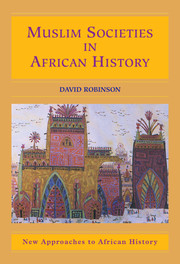Book contents
- Frontmatter
- Acknowledgments
- Contents
- LIST OF MAPS AND FIGURES
- INTRODUCTION
- PART I The Historical and Institutional Background
- PART II General Themes
- PART III Case Studies
- 7 Morocco: Muslims in a “Muslim Nation”
- 8 Ethiopia: Muslims in a “Christian Nation”
- 9 Asante and Kumasi: A Muslim Minority in a “Sea of Paganism”
- 10 Sokoto and Hausaland: Jihad within the Dar al-Islam
- 11 Buganda: Religious Competition for the Kingdom
- 12 The Sudan: The Mahdi and Khalifa amid Competing Imperialisms
- 13 Senegal: Bamba and the Murids under French Colonial Rule
- CONCLUSION
- GLOSSARY
- INDEX
12 - The Sudan: The Mahdi and Khalifa amid Competing Imperialisms
Published online by Cambridge University Press: 05 June 2012
- Frontmatter
- Acknowledgments
- Contents
- LIST OF MAPS AND FIGURES
- INTRODUCTION
- PART I The Historical and Institutional Background
- PART II General Themes
- PART III Case Studies
- 7 Morocco: Muslims in a “Muslim Nation”
- 8 Ethiopia: Muslims in a “Christian Nation”
- 9 Asante and Kumasi: A Muslim Minority in a “Sea of Paganism”
- 10 Sokoto and Hausaland: Jihad within the Dar al-Islam
- 11 Buganda: Religious Competition for the Kingdom
- 12 The Sudan: The Mahdi and Khalifa amid Competing Imperialisms
- 13 Senegal: Bamba and the Murids under French Colonial Rule
- CONCLUSION
- GLOSSARY
- INDEX
Summary
Muhammad Ahmad, the Mahdi of the Sudan, was the African Muslim best known to the outside world in the nineteenth century. Preacher, teacher, and writer, he lived just over forty years (1844–85) but left an indelible imprint on his native region. He drew on his understanding of Islam to mobilize a major portion of the Muslim population against foreign intrusion and economic decline. He understood that God was calling him to be the Mahdi, the rightly guided one who comes during the troubled times at the end of the world.
The imperialism he faced goes by the name of the Turko-Egyptian regime or Turkiyya. The Sudanese, over the course of the nineteenth century, came to use the expression “Turk” to refer to all of the people of Turkic, Slavic, Arab, or European origin associated with the regime and its exploitation. Egypt, still officially part of the Ottoman Empire, began to expand in the early nineteenth century after Napoleon's invasion and under the direction of Muhammad Ali (see Chapter 6). From Cairo and a southern base in Khartoum, Muhammad Ali commissioned traders to find sources of slaves and ivory in the upper reaches of the Nile and support the dramatic modernization process of Egypt. Beginning in the 1820s these entrepreneurs explored, traded, and raided in the vast marshes of the Upper Nile. They set up villages and factories in the northern or Arabic-speaking areas of the Sudan and preyed upon the small-scale societies to the south (see Map 5).
- Type
- Chapter
- Information
- Muslim Societies in African History , pp. 169 - 181Publisher: Cambridge University PressPrint publication year: 2004



